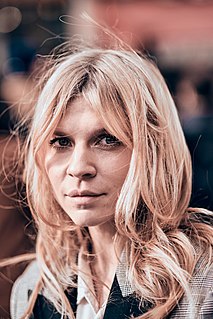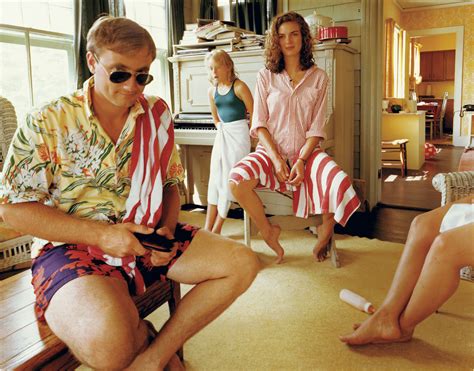A Quote by Andy Biersack
And the people who say things to you about the way you look and the way you dress, they have nothing more to their lives. That's all they do, and you have something more in you.
Related Quotes
I’m not fascinated by people who smile all the time. What I find interesting is the way people look when they are lost in thought, when their face becomes angry or serious, when they bite their lip, the way they glance, the way they look down when they walk, when they are alone and smoking a cigarette, when they smirk, the way they half smile, the way they try and hold back tears, the way when their face says they want to say something but can’t, the way they look at someone they want or love… I love the way people look when they do these things. It’s… beautiful.
Look, in particular, at the people who, like you, are making average incomes for doing average jobs- bank vice presidents, insurance salesmen, auditors, secretaries of defense- and you'll realie they all dress the same way, essentially the way the mannequins in the Sears menswear department dress. Now look at the real successes, the people who make a lot more money than you- Elton John, Captain Kangaroo, anybody from Saudi Arabia, Big Bird, and so on. They all dress funny- and they all succeed.
I'm not the type to generalise about an entire generation. I think the most general thing I can say, is that things are way more dispersed, and way more de-centralised than they were twenty years ago. I don't really feel like people talk about my generation the way people would talk about Generation X in their early 90's when Nirvana blew up. I feel like there was an easier, more coherent narrative to find, than you can now.
Jesus doesn't say, "The religion founded in my name is the way, the truth, and the life, [and] what people say about me is the way." "Our way of worship, the Christian structure, is not the way," [he would say,] "I am. I am. If you want to know what life is all about, what it's supposed to be, where it's supposed to go, where it's supposed to derive its strength from, don't look at anything people say about me. Don't look at the faith that's been created. Look at my life, which is a life ultimately of sacrificial love."
Philosophy is not a body of knowledge to impart to someone, that's why reading philosophy books isn't always the best way of learning philosophy. Philosophy is really more the process of rational engagement, rational reflection with a diversity of views and ideas and opinions and trying to sort of reason your way through to a more reflective position. I think if you look at it that way, philosophizing is to some extent some small way a part of almost everyone's lives although they don't recognize it as such and a lot of people are embarrassed about it.
The unreal is more powerful than the real. Because nothing is as perfect as you can imagine it. Because its only intangible ideas, concepts, beliefs, fantasies that last. Stone crumbles. Wood rots. People, well, they die. But things as fragile as a thought, a dream, a legend, they can go on and on. If you can change the way people think. The way they see themselves. The way they see the world. You can change the way people live their lives. That's the only lasting thing you can create.
In Brazil, even inside the same city, people from different parts dress differently. Sao Paulo, for example, is more connected to global trends and urban movements. Rio de Janeiro is more influenced by the beach, and has a sort of Cali vibe with the way people dress. Porto Alegre down in the south has a hard winter, so people have to dress to face the cold days.
When you take the entire system into account, ways of developing more of something in one dimension can actually create scarcities in another. If we say we have to increase production because people need more food, more housing, more meat, or more milk, we can make one thing grow in a certain way. But by doing that we create externalities so that there are scarcities in other related things.
We are little animals walking on the ground, we have a certain life time, we are acting and interacting with different people, and we are trying to build things, but we are just some sort of virus compared to the entire sky. You always have to remember that the moon, the earth, the sun, they are like the real universal objects. We are just passing by, and it makes life more beautiful to think that way. More relaxing to think that way, that nothing is really important, because you give yourself much more confidence and you forgive yourself more things when you think about that.
Cars are like children: It's hard to say that any one is more special than the other. There are little things about each car that you come to love, whether it's the look, the steering wheel, the way it drives, or even the way it drives differently when you put the top up. They all have identities; they have spirits and characteristics that are truly endearing in some way.
I think the future fashion will be more and more separated-like, on one side would be big distribution, and on the other side there will be high-level prêt-à-porter and couture. I mean, the prêt-à-porter is already couture in a way for the prices and the way that it's made. The big distribution will allow people to dress in a fashionable way, so this could be for everybody. This part of the big distribution will be stronger and stronger, but the other part we are coming up on is more and more rich people, because we are always thinking about Europe and about America.




































